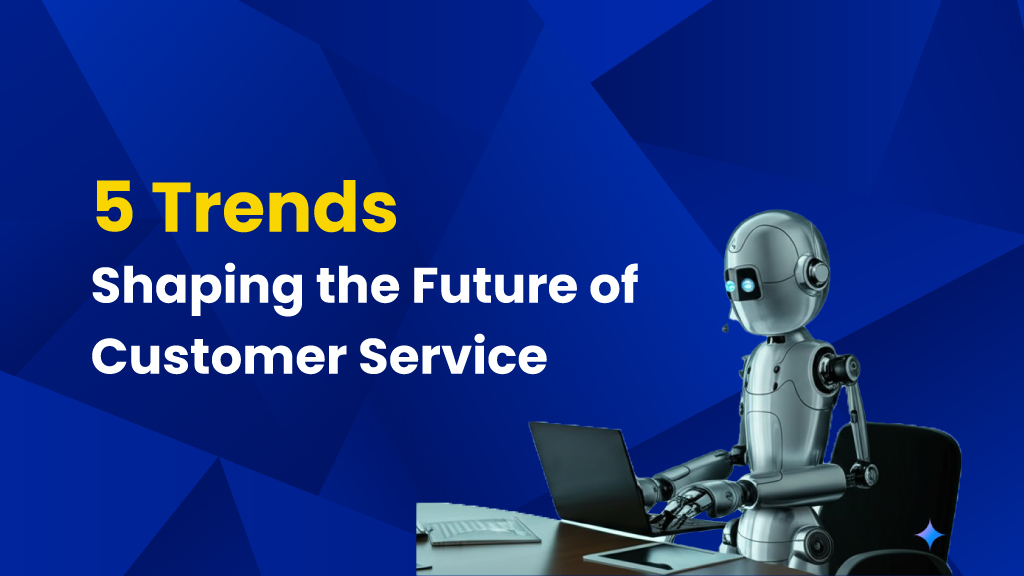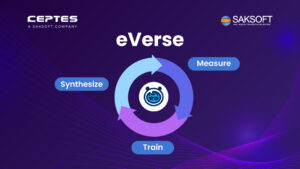What do customers really want?
At its core, exceptional customer service is about stepping into your customer’s shoes, understanding their needs, and delivering exactly what they expect. And let’s be honest, no one wants to spend endless minutes on hold, listening to a repetitive tune, hoping someone will resolve their issue before frustration takes over.
Fortunately, customer service has evolved far beyond those frustrating experiences. Today’s customers expect fast, personalized, consistent support whenever they interact with a brand. Meanwhile, businesses are looking for innovative ways to reduce effort in customer service while enhancing customer experiences — all without stretching their budget.
From AI-driven solutions to hyper-personalized interactions and seamless omnichannel support, modern trends are redefining customer engagement and service excellence. The future of customer service lies in empowering businesses to connect with and support their customers through innovative solutions that meet evolving expectations and provide a strategic advantage.

Did you know that 85% of decision-makers expect the service to contribute more to revenue this year? In a world where customers demand instant, personalized service, businesses must adapt fast to stay ahead.
In this blog, we are diving into the top trends of customer service in 2025 and beyond that will transform how businesses connect and support their customers.
1. AI Creates the Moment of Opportunity
AI isn’t here to replace your service teams; it’s here to empower them. According to research, 45% of service decision-makers are already using AI, a significant jump from just 24% in 2020. AI empowers customer service agents to focus on complex, high-value interactions while handling routine queries automatically. This shift elevates agents into strategic problem-solvers, driving revenue growth.
However, many business leaders believe that implementing AI in customer service would require a major investment in infrastructure. But the truth is, 79% of high performing organizations are investing in AI seeking efficiency amid tougher workloads. With proactive support, predictive analytics for hyper personalized service offerings, machine learning to improve customer interactions based on feedback – organizations must see AI as an opportunity to enhance operational efficiency, reduce costs, and improve customer satisfaction.
Start by identifying routine queries AI can handle, then integrate AI-driven analytics to predict customer needs.
2. Value-Driven Services with GenAI:
The buzz around Generative AI isn’t just hype — it’s driving real transformation. GenAI tools with natural language understanding can understand and categorize customer intent better than ever. These capabilities help eliminate the root causes of low-value service interactions, allowing the service team to focus on more meaningful, value-driven engagements. GenAI assistants can retrieve real-time data to help agents provide tailored solutions during live interactions. It also automates customer journey mapping, helping teams deliver highly personalized experiences.
Redefine your metrics to focus on value realization. While traditional measures like Customer Effort Score (CES), Customer Satisfaction (CSAT) remain important, complement them with value-driven goals. Track metrics such as adoption rate, customer health, time to value, and Value Enhancement Score (VES). Over time, incorporate deeper targets like churn reduction, retention rates, repurchase trends, and customer expansion to measure long-term success.
Track AI-driven metrics like Value Enhancement Score (VES) to measure long-term impact
3. Smarter Field Service Management:
Frontline workers face constant pressure to deliver fast, high-quality service. 65% of mobile workers feel this burden, and 82% struggle to balance speed with quality.
AI-powered field service solutions are turning the tide:
- Predictive Maintenance: AI anticipates equipment failures and schedules proactive maintenance.
- AI-Generated Work Summaries: Automated reports reduce paperwork and improve job accuracy.
- Enhanced Self-Service Tools: Customers can book appointments and track their progress directly via chat or portals — reducing admin work for field agents.
Apart from that, innovations like AI-powered wearable technology and intelligent agents will be transforming field service operations. With 37% of mobile workers already using AR apps, tools like Apple Vision Pro and smart glasses are enhancing technician capabilities by providing real-time data, step-by-step guidance, and expert support.
4. Self-Service: A Win-Win for Customers & Businesses
Today’s customers prefer self-service for simple issues. In fact, 61% of customers prefer solving problems independently rather than calling support.
High-performing organizations are embracing self-service with:
- AI–powered chatbots: Delivering fast, accurate responses to common questions.
- Customer portals: Empowering users to manage their profiles, track orders, and resolve issues autonomously.
- Knowledge centers: Offering clear, updated content for self-help.
However, self-service isn’t foolproof — 72% of customers avoid a chatbot after one bad experience. While some issues require human agents, businesses can improve self-service success by simplifying instructions and keeping resources updated. On average, self-service resolves 54% of customer issues in organizations that implement it effectively.
5. Omnichannel Experiences for Seamless Support
Today’s customers expect businesses to meet them where they are. Effective omnichannel strategies ensure seamless interactions across platforms like email, phone, social media, live chat, and even emerging solutions like voice assistants, video conferencing, AR, and VR.
Leading brands are embracing omnichannel strategies that unify customer interactions across multiple touchpoints. For example, a customer starting a query with a chatbot can seamlessly continue the conversation with a live agent without repeating themselves.
This approach builds trust by maintaining conversation history and context as customers switch channels. To implement omnichannel support successfully, businesses should identify key customer channels, adopt robust CRM solutions, train staff and AI agents for consistent communication, and stay compliant with evolving data regulations.
Final Thought: Are You Ready to Embrace the Future?
The future of customer service is smarter, faster, and more customer centric. AI-driven customer service will continue to make headlines for a few years now. High performing organizations will continue to combine AI, automation, and human expertise to create seamless customer experiences that drive loyalty and revenue.
So, what’s your next step? Start by empowering your teams with AI-driven tools, building proactive customer experiences, and embracing a unified strategy that brings service, sales, and marketing closer than ever before.
Because in 2025, exceptional service is your business’s biggest opportunity for growth. Embrace the future of customer service with CEPTES. Contact us for more consultation.
FAQ:
1. What role does data security play in AI-driven customer service?
2. What are the biggest challenges in implementing AI for customer service?
3. Can AI help improve customer retention in service operations?

Nilamani Das
Nilamani is a thought leader who champions the integration of AI, Data, CRM and Trust to craft impactful marketing strategies. He carries 25+ years of expertise in the technology industry with expertise in Go-to-Market Strategy, Marketing, Digital Transformation, Vision Development and Business Innovation.


















